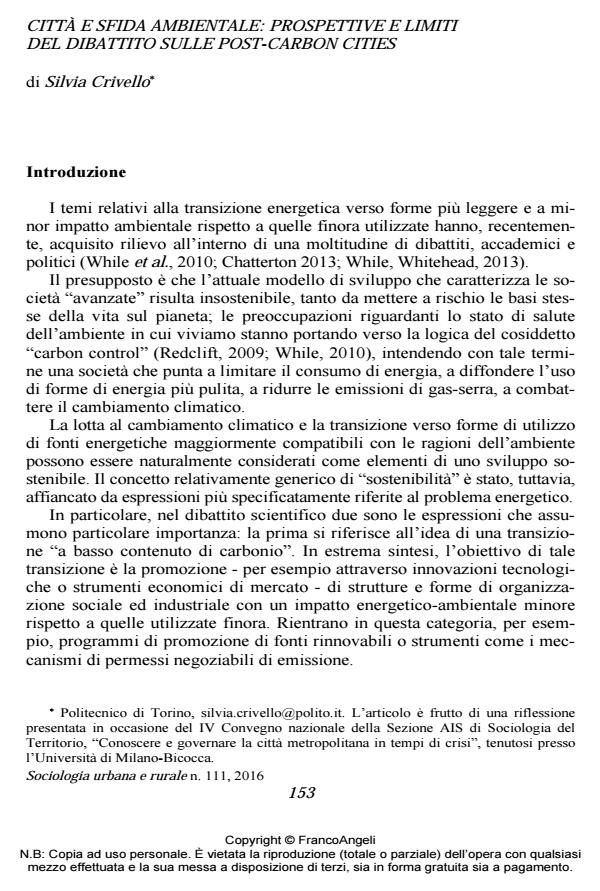Città e sfida ambientale: prospettive e limiti del dibattito sulle post-carbon cities
Titolo Rivista SOCIOLOGIA URBANA E RURALE
Autori/Curatori Silvia Crivello
Anno di pubblicazione 2017 Fascicolo 2016/111
Lingua Italiano Numero pagine 14 P. 153-166 Dimensione file 171 KB
DOI 10.3280/SUR2016-111010
Il DOI è il codice a barre della proprietà intellettuale: per saperne di più
clicca qui
Qui sotto puoi vedere in anteprima la prima pagina di questo articolo.
Se questo articolo ti interessa, lo puoi acquistare (e scaricare in formato pdf) seguendo le facili indicazioni per acquistare il download credit. Acquista Download Credits per scaricare questo Articolo in formato PDF

FrancoAngeli è membro della Publishers International Linking Association, Inc (PILA), associazione indipendente e non profit per facilitare (attraverso i servizi tecnologici implementati da CrossRef.org) l’accesso degli studiosi ai contenuti digitali nelle pubblicazioni professionali e scientifiche.
Tanto a livello accademico che a livello politico sono, oggi, sempre più numerosi i dibattiti che affrontano i temi riguardanti la transizione energetica intesa come il passaggio verso forme a minor impatto ambientale rispetto a quelle adottate finora. Il paper, partendo dall’assunto secondo cui il modello di sviluppo delle società "avanzate" risulta ormai insostenibile, sottolinea come le preoccupazioni riguardanti lo stato di salute dell’ambiente stiano indirizzando verso una nuova logica cosiddetta del "carbon control". L’articolo si concentra, da un lato, sulla trasposizione del concetto di transizione energetica alla scala di città. Dall’altro, il contributo riflette sugli strumenti concettuali e metodologici che la sociologia urbana è in grado di fornire per agevolare la comprensione del fenomeno della transizione e per contribuire alla formulazione di possibili soluzioni.
Parole chiave:Transizione energetica, città, cambiamento climatico, giustizia energetica, post-carbon, carbon control.
Silvia Crivello, Città e sfida ambientale: prospettive e limiti del dibattito sulle post-carbon cities in "SOCIOLOGIA URBANA E RURALE" 111/2016, pp 153-166, DOI: 10.3280/SUR2016-111010